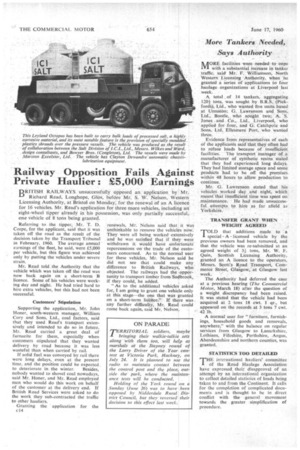Railway Opposition Fails Against Private Haulier : £5,000 Earnings
Page 50

If you've noticed an error in this article please click here to report it so we can fix it.
BRITISH RAILWAYS unsuccessfully opposed an application by Mr.
Richard Read, Longhope, Glos, before Mr. S. W. Nelson, Western Licensing Authority, at Bristol on Monday; for the renewal of an A licence for 16 vehicles. Mr. Read's application for three more vehicles, including an eight-wheel tipper already in his possession, was only partially successful, one vehicle of 8 tons being granted.
Referring to the tipper, Mr. T. D. Corpe, for the applicant, said that it was taken off the road as the result of the decision taken by the Transport Tribunal in February. 1960. The average annual earnings of the fleet, he said, were £5,000 per vehicle, but this figure was achieved only by putting the vehicles under severe strain.
Mr. Read told .the Authority that the vehicle which was taken off the road was now back again on a short-term B licence. Some of his vehicles were working day and night. He had tried hard to hire extra vehicles, but this had not been successful.
Customers' Stipulation Supporting the application, Mr. John Honer, south-western manager, William Cory and Sons, Ltd., coal factors, said that they used Read's transport extensively and intended to do so in future. Mr. Read carried a great deal of furnacite for them, especially when customers stipulated that they wanted delivery by road because it was less wasteful than when carried by rail.
If solid fuel was conveyed by rail there were long delays, even at the present time, and the position could be expected
to deteriorate in the winter. Besides, nobody wanted to shovel coal nowadays, said Mr. Honer, and Mr. Read employed men who would do this work on behalf of the customer at the delivery end. If British Road Services were asked to do the work they sub-contracted the traffic to other hauliers.
Granting the application for the c14 renewals, Mr. Nelson said that it was unthinkable to remove the vehicles now. They were all being worked extensively and he was satisfied that if they were withdrawn it would have unfortunate repercussions on the trade of the customers concerned. As to the normal user for these vehicles, Mr. Nelson said he did not see that could make any difference to British Railways, who objected. The railways had the opportunity to transport timber from Sudbrook, if they could, he added.
"As to the additional vehicles asked for, I am going to grant one vehicle only at this stage—the one that was granted on a short-term liderice." If there was any further difficulty, Mr. Read could come back again, said Mr. Nelson.
























































































































